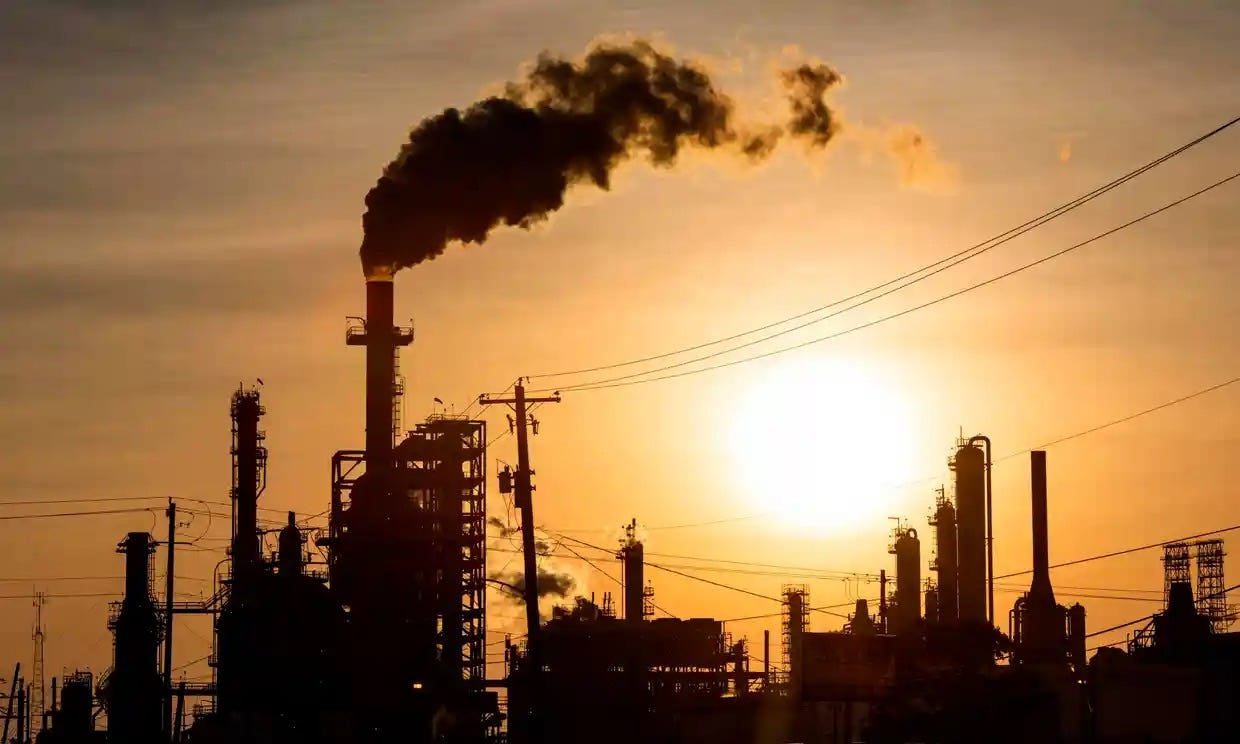Big Oil’s ‘Two-Level Game’ Against Climate Action
Oil and gas companies are touting their support for groups like the Climate Leadership Council—while doubling down on fossil fuels.

We are the Green New Deal. It was a rallying cry for a climate uprising, the kind of statement that could be chanted at sit-ins and rallies and marches across the country. It symbolized the beginning of America’s effort to finally tackle the climate crisis.
At least that’s what the slogan was supposed to sound like when it was adopted by the Sustainable Future Coalition, an industry group whose members included oil and gas companies and their powerful trade associations.
While some coalition members were initially skeptical, a public relations agency convinced them that the tagline would help them defeat the new president’s sweeping climate agenda. “Resurrecting the Green New Deal on our terms means we can co-opt the political center while inflaming the passions of the right and hard left,” explained one member of the PR team. Her colleague put it more simply: “The Green New Deal will be whatever we say it is.”
The Sustainable Future Coalition isn’t real. The group is a creation of the novelist Stephen Markley; it exists only in the pages of his latest book, The Deluge, a wonky and unsettling cli-fi (“climate fiction”) epic that spins out an all-too-plausible future of fires, floods, and freak weather events.
Yet the fictional Sustainable Future Coalition bears a striking resemblance to another oil and gas-backed group that does exist and is trying to shape U.S. climate policy: the Climate Leadership Council (CLC), a Washington, DC-based nonprofit that advocates for scrapping certain environmental regulations and replacing them with a carbon tax, with the proceeds from that tax returned to Americans as a rebate.
My most recent contribution to The Guardian, “Meet the DC think tank giving big oil ‘the opportunity to say they’ve done something’,” explores the CLC and shows how industry interests are using the group to advance an agenda that has very little to do with addressing climate change. As I argue in the story:
To its critics…the policy details of the CLC plan and those it supports are secondary to what the group itself offers its oil and gas industry members: a climate change “solution” that they can be for—one that, conveniently, stands little chance of becoming law.
As fossil fuel companies continue lobbying against climate legislation, funding anti-climate politicians, bringing home sky-high profits from oil and gas sales, and doubling down on business models anchored on fossil fuel extraction and consumption, public participation in a “climate leadership council” appears to be an asset that corporations can deploy to perform the role of problem-solver while justifying their opposition to other laws and regulations.
In the eyes of its industry backers, at least, what the CLC’s proposal appears to provide is a low-risk way to be on the record endorsing something. Unlike earlier chapters in the history of climate obstruction, this approach is characterized not by denial or outright deceit but by performance. As Matto Mildenberger, a political science professor at the University of California Santa Barbara, told me:
“[Companies] are playing a two-level game here. … On one hand, part of their strategy is to ensure that whatever policy gets written into law, or is voted on, is the lesser evil of the policies that might be voted on. And then they’re still going to try and stop even that policy from being passed because they prefer no policy.”
I have little doubt that many of the CLC’s supporters, staffers, and board members believe that the group’s “consensus climate solution” represents a worthy pursuit and a genuine effort to tackle climate change. But as so many climate campaigners and environmental justice advocates have been reminded time and time again, earnest intentions alone are no match for the money and might of the fossil fuel lobby.
You can read the full story here: “Meet the DC think tank giving big oil ‘the opportunity to say they’ve done something’.” Thanks as always to Dominic Rushe and the team at The Guardian.

